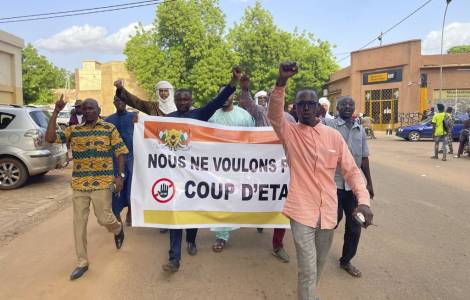
Niamey (Agenzia Fides) - "The current fifth coup d'état seems unique, also because of the creative way in which it is being carried out", explains Father Mauro Armanino of the Society of African Missions (SMA) to Fides, from Niamey, after the military coup in Niger on 26 July. "It is the fifth consecutive coup d'état in the country since, like many other African countries, it gained independence from France in 1960," he said. "The National Stadium in Niamey now bears the name of President Seyni Kountché, the military man who carried out the first coup d'etat a dozen years after independence was mentioned. In the short span of the Republic, the possible and the unimaginable in a constitutional state was seen. For example, military president Baré Mainassara was brutally murdered by his closest guards at the capital's airport in 1999. The perpetrators and those behind them have not been prosecuted to date, said the missionary. "The deposed president, Mohamed Bazoum, is a prisoner in the lower floor of his palace, and the authors of the coup d'état are the military officers of the Presidential Guard, who were supposed to protect him from what happened, emphasizes Father Armanino.
"The other military gradually sided with the coup plotters who overthrew the regime of the Seventh Republic and suspended the constitution along with the political parties. The threats of armed intervention and economic and political sanctions have, so far at least, produced no significant results, except that a large part of the population has rallied around the military. The coup itself, atypical in its execution, thus contributes to creating mixed emotions in the heart of the city." "In the meantime, the National Council for the Protection of the Fatherland (CNPS) has appointed a new prime minister, ministers and (military) governors in the various regions into which the country's administration is divided," explains the missionary, commenting on developments in the country.
"Every Sunday and sometimes also during the week, the population demonstrates in support of the military junta, especially as the threats of military intervention by the Community of West African States (ECOWAS) become louder. For the rest, everything goes on as usual for ordinary people, and the daily struggle for survival is confirmed and intensified by prolonged power outages, rising prices and the blockade of borders for trucks carrying perishable goods". "In the air of the capital there is a sense of anticipation of further developments," says the missionary. "Between more or less successful attempts at mediation and recurring threats of armed intervention, the daily survival of ordinary people flows like the river Niger". (Agenzia Fides, 25/6/2023)